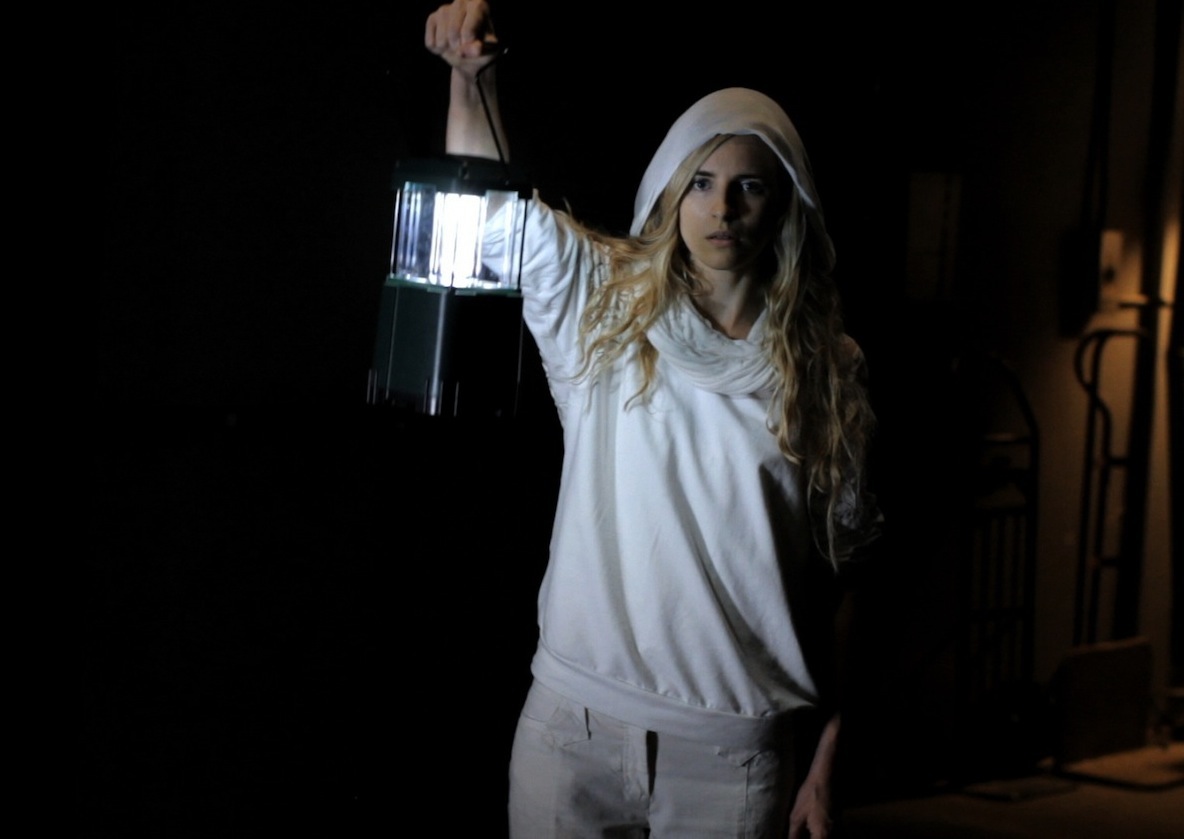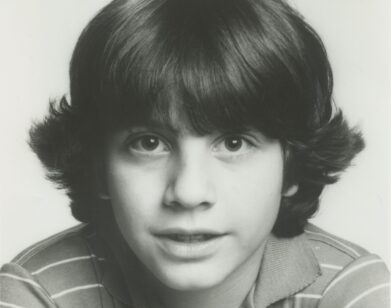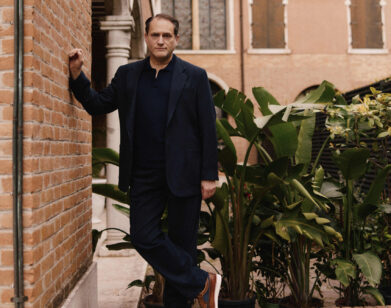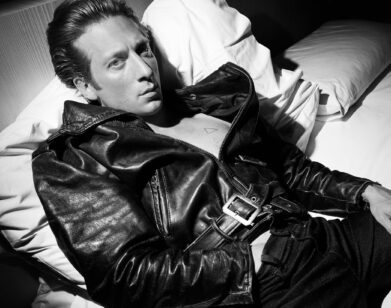Brit Marling’s Temporal Lobe

ABOVE: BRIT MARLING IN SOUND OF MY VOICE. PHOTO COURTESY OF FOX SEARCHLIGHT
Challenging our beliefs about the possibilities of reality, Sound of My Voice, the latest film from Brit Marling and her collaborator, writer/director Zal Batmanglij, is a hypnotic psychological thriller that traces the journey of Peter (Christopher Denham) and Lorna (Nicole Vicius), a journalist and his girlfriend who attempt to infiltrate a cult and expose it as a fraud. The couple weathers a series of brutal indoctrination practices and emotional tests, ultimately finding their relationship to the world, and to each other, forever altered.
At the center of Sound of My Voice is Maggie (played by Marling), a young woman who presents herself as a time traveler from 2054. She is a seducer, an oracle, and an interloper all at once, an amalgam of enlightenment and violence. Legitimate or not, Maggie is a force to be reckoned with, testing the fragility of human vulnerability and one’s capacity for faith.
The last time Interview spoke with Marling was on the occasion of the release of last year’s science fiction drama Another Earth. Later this year, Marling will be seen in Arbitrage with Richard Gere and Susan Sarandon, and in The Company You Keep, alongside Robert Redford and Julie Christie. Another Batmanglij/Marling collaboration, The East (starring Ellen Page and Alexander Skarsgård) is currently in post-production.
We sat down with Marling earlier this week to discuss acting, the logistics of time-traveling, and how it all started with a dream.
COLLEEN KELSEY: Could you tell me a bit about the process of how you developed Sound of My Voice?
BRIT MARLING: Zal and I, in the beginning when we were trying to write, would set aside these four-hour blocks and say, “From this time to this time we’re going to turn off our cell phones, and not do email, and we’re just going to focus on writing.” At the time we were writing this film called The East, and Zal came in one day and said, “I had this dream.” And I was like, “No, no, no, we have to focus, I don’t care about your dream.” And he was like, “No, I had this dream, and in the dream my hands were bound, and I was blindfolded, and I was wearing this hospital gown, and I was being led down these basement stairs.” That image was so provocative and so unsettling and terrifying, really, that we just sort of riffed off of that, and we just kept going back and forth and it was like, “Okay, what’s happening in that basement? Maybe there’s a group of people meeting there, what are they doing? Oh, it’s a cult! Well, who’s leading the cult? Why are they in this basement?” We kept going and kept telling the story to each other out loud, just playing, really, and then this whole world emerged. And we were like, “Okay, there’s a movie in here.”
KELSEY: Cults are such a seductive subject. There’s such a wealth of elements to explore—control, power dynamics, people’s vulnerability. How did you go about establishing the ideology of the cult in the film? Did you do a lot of research?
MARLING: You know, everything really came from the time-traveler bit. This idea entered that she was a time traveler, and then we really got practical and earthy about it. A time traveler is not an angelic force; a time traveler is just a human being. Human beings are flawed and complicated and messy. So what happens when you have a very ordinary girl who’s in possession of extraordinary knowledge? Whether she is or isn’t, either she’s faking it, and even if she’s a fraud, she has an extraordinary ability to imagine. If she did really experience it, then that’s extraordinary too. I think everything came out from there. Okay, well, if you fly from New York to LA, your immune system feels it. You get sick, or you arrive and you’re behind on the time. What happens when you travel back two decades in time? Time travel jet lag must be insane! [laughs] So, then what does that practically mean? She’s this 20-year-old girl wheeling in this oxygen tank. It’s such a weird contrast to see this young girl with oxygen tubes in her nose. So those details in the story started to unfold from trying to think about grounding something potentially magical in familiar spaces.
KELSEY: So with Maggie, after figuring her character out on paper, how did you transition to approaching her physically?
MARLING: That’s such a good question. I think when we were writing, I didn’t realize how overwhelming the challenge was until I sat down to do the acting work, and I was like, “Oh my gosh, I don’t think I can pull this off.” She scared me.
KELSEY: She’s a strong force.
MARLING: She’s so charismatic and compelling and you’re like, “Oh my God, how do you act that?” I think eventually I got to the bottom of it just thinking less about her effect on people and more about why she needs to have that effect. That actually led to a very human and vulnerable place. Maggie needs all this attention and needs all this love from people, and I think it’s because, ultimately, she’s vulnerable and insecure, and as an actor you’re always looking for the point of empathy that allows you to enter someone. With Maggie, she’s sometimes very vicious and very cruel, but as the actor you can’t judge the character. You have to be like, “Why am I acting this way and why does it having this effect?” So, it’s actually a great exercise, because it allows you to come at almost any human situation with a certain amount of empathy and understanding.
KELSEY: There is the ambiguity of “Is she a real person, is she a time traveler, is she a fraud?” Did you think about her background in terms of if she’s this contemporary person who has all of these issues and needs to project herself onto people and get that attention, or if she actually is this figure from the future who returns as a savior-figure? Because she has two potential pasts.
MARLING: Totally. It’s funny because, of course as an actor, I can never really say what it was that I was thinking, because it sort of takes all the fun out of the story, but you do have to create that detailed backstory and that history because you’re drawing from that. What I think is amazing about a film, or the kind of films that I like to watch anyway, is that they’re not spoon-feeding you what’s happening. You’re allowed to meet it halfway. The story is actually Peter and Lorna’s journey and they have a very complete arc, and neither one of them is the same person at the end of the film that they are in the beginning. Their relationship changes, they change. It’s ultimately, I think, a story about faith and belief, and of course one criteria of faith is that you can’t ultimately have proof. There’s always the “What if?”
KELSEY: One of the things I really liked about Sound of My Voice, and similarly in Another Earth, is that there are these sci-fi elements that structure the narrative, but ultimately it’s the exploration of human relationships that ground the films. I felt that way with Peter and Lorna, seeing their journey, but also something I really responded to was Peter’s relationship with his mother, who had died as a result of involvement with a cult. I felt that his motivation about getting involved, but it was tinged with this weirdness. It’s sort of an attempt at revenge, but not an overtly formulated one.
MARLING: That’s so interesting. I think that we all respond to past trauma in interesting ways. For Peter, it’s both a flight from what his mother was, and at the same moment…
KELSEY: He’s getting closer to her.
MARLING: He’s getting closer to her! Which is so strange. He feels he’s running away from it, but he’s running right into the arms of it. I mean, in a way, to understand his mother better but also to understand what parts of him really are from his mother. Chris [Denham] said it really well the other day during a Q&A. He was like, “Peter begins the movie very much in control, but you have to question what kind of person is going on this journey, and does that person ultimately want to be made out of control?”
KELSEY: I feel like because of Maggie’s appearance as an ethereal, mystic figure, people really respond to her. But when she has her moments of revealing her violent side, I was really shaken up by it.
MARLING: I was too.
KELSEY: I felt as if the cult members didn’t have that sort of response.
MARLING: Interesting. Like when’s she’s grilling Peter… I think it’s because they’ve all been through it. Klaus even says in the beginning, “This is sometimes difficult and unsettling. Brace yourself.” What’s funny is they’ve all been through it and they have all feel the same release or euphoria that Peter eventually feels, which is like, “Ahhh, the pleasure to be seen by someone and be understood.” I think when Peter’s faking it, or not faking it, in that moment, it seems like he’s having some sort of emotional release. Some people go into therapy for three or four or five years, attempting to get at whatever nuclear script is at the center, and Maggie seems to get it in an instant, and she’s going to push on it. And it’s not going to be comfortable, and she’s not going to wait until you’re ready. She’s just going to go there. I would love someone to do that to me.
KELSEY: You just don’t know what the result is at all—how you’re going to respond to that kind of push.
MARLING: How are you going to respond to that kind of push? How do you think you would respond if someone did that to you? Would you want that?
KELSEY: I think that most people probably wouldn’t want to go there, to realize a part of yourself that you don’t know exists. Even thinking about that old thing, you know, that we only use a minuscule percentage of our brain throughout our lives—building on that, the fact that there could be something lurking within you is a completely frightening thought, but once you’re made aware of it, it could change your life.
MARLING: Wow. That’s true. I forget all the time that there are two ways to go. There are people who don’t want to go there, and maybe you don’t need to. Maybe the past is better left in the past.
SOUND OF MY VOICE IS OUT TOMORROW IN THEATERS.






